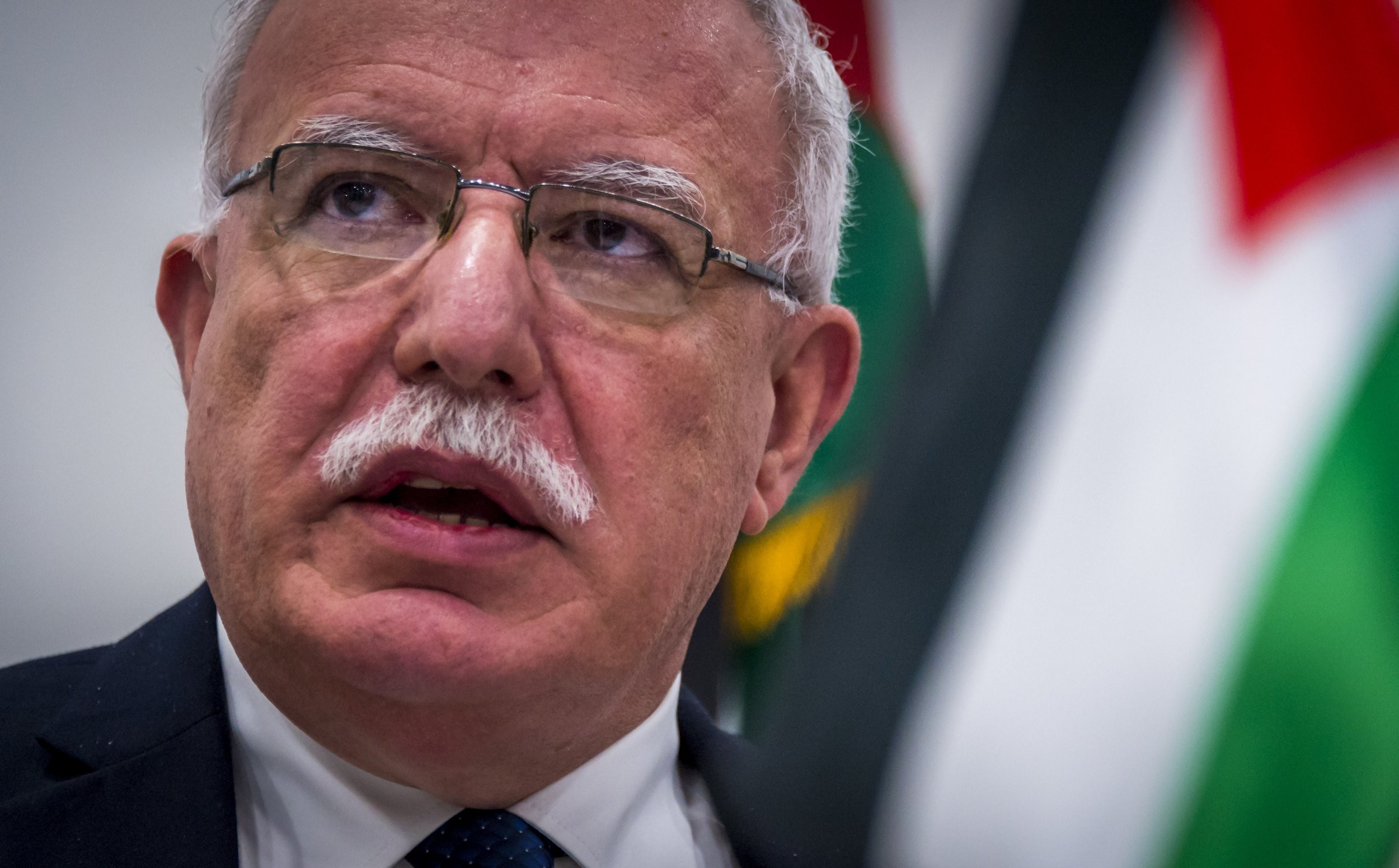
The Palestinian National Authority's foreign minister predicted that President Donald Trump's long-awaited Middle East peace plan would favor Israel and attempt to legitimize what he described as Israeli apartheid policies.
Speaking at an event at an event organized by the Chatham House think tank, Riyad al-Maliki discussed the beleaguered peace process between the Israelis and the Palestinians, painting a pessimistic picture of the White House's efforts to resolve the intractable conflict.
Trump directed senior adviser and son-in-law Jared Kushner and White House Middle East envoy Jason Greenblatt to create a peace plan that could bring an end to generations of conflict between the Israelis and Palestinians. The White House has stayed tight-lipped on when the proposal would be released in full, though Kushner indicated in April the administration would "start unveiling" the plan after Ramadan, which ends on June 4.
But the Trump administration's close relationship with Israel and languishing ties with the Palestinians have raised concerns that the peace deal—which Kushner said would call for compromise on both sides—would be designed to benefit Israel and subjugate the Palestinians.
"This administration is preparing to give its stamp of approval to Israel's colonial policies," al-Maliki said on Friday. "The administration has shown nothing but disregard for Palestinian rights and Palestinian lives."
Israel's "colonial" control of the Palestinian territories is, al-Maliki suggested, designed to "ensure confinement and expansion of Israeli settlers with the objective of maximum land with minimum Palestinians." He claimed the Palestinians were now in "the final stages of this masterplan that Israel is no longer even trying to hide, and which can only be described as colonialism under the disguise of occupation."
Dialogue between Washington and the Palestinians collapsed after Trump announced he would move the U.S. Embassy from Tel Aviv to Jerusalem—the disputed holy city claimed by Israel as its capital and by the Palestinians as the capital of a future independent state.
More than 100 protesters were killed in subsequent demonstrations in the Gaza Strip against the embassy, which also called for the right of Palestinian refugees and their descendants to return to the lands they left upon the creation of Israel in 1948. Even as U.S. officials attended the opening ceremony of the new Jerusalem facility, dozens of Palestinians were shot dead by Israeli soldiers along the Gaza border.
Palestinians were further outraged when U.S. representatives—including Kushner and then-Ambassador to the United Nations Nikki Haley—blamed Palestinians, and, specifically, the Islamist militant group Hamas, which controlled the Gaza Strip, for the bloodshed.
While offering near-unquestioning support of Israel and Prime Minister Benjamin Netanyahu—a self-described nationalist who heads arguably the most right-wing government in the country's history—the Trump administration also cut tens of millions of dollars of funding for Palestinian security services and refugee organizations.
America's role as the primary mediator means the steering wheel of peace negotiations has been left "in the hands of a reckless driver," al-Maliki said. He added that the Palestinians were not willing to wait until the driver, i.e., Trump, "goes over a cliff or runs over the Palestinian people."
Al-Maliki pointed to an op-ed by Secretary of State Mike Pompeo and U.S. Ambassador to Israel David Friedman published in The Wall Street Journal earlier this week, which supported Trump's decision to recognize the disputed Golan Heights as Israeli territory. Such justification shows that the Trump administration is "trying to bend the law to accommodate violations instead of ending violations to uphold the law," the foreign minister argued.
Al-Maliki warned that the U.S. peace plan "is in fact the consecration of our century-old ordeal: no independence, no sovereignty, no freedom and no justice." He added that if the U.S. did "not think that this situation will have an impact on the future of Israel and the region one way or another, they are the ones that are delusional, and not us."
Earlier this month, Kushner criticized the Palestinian leadership for its opposition to the coming peace deal, suggesting it should wait and see what it said before rejecitng it.
"We tried to figure out how to design something that we think can be very acceptable to them, and the question will be whether the leadership has the courage to try to jump in," Kushner said at an event organized by the Washington Institute for Near East Policy. "It's been very disheartening for us that the Palestinian leadership has been attacking a plan [when they] don't even know what it is."
Uncommon Knowledge
Newsweek is committed to challenging conventional wisdom and finding connections in the search for common ground.
Newsweek is committed to challenging conventional wisdom and finding connections in the search for common ground.
About the writer
David Brennan is Newsweek's Diplomatic Correspondent covering world politics and conflicts from London with a focus on NATO, the European ... Read more
To read how Newsweek uses AI as a newsroom tool, Click here.






